
The abundance of (epic) tragedy is KDrama at its finest - meanwhile the Joseon empire is born
"My Country - The New Age" is set in the historical transition period between the Goryeo era and the Joseon era. The context is General Yi Song-gye, who for the next approximately 5 centuries tied the throne to his bloodline with a coup d'etat. However, this KDrama isn´t a history lesson as such, though historical figures get involved. Also romance is not the predominant matter. ... First and foremost it's about loyalty, unconditional male friendship and love as its basis. Secondly, it is about relationships between fathers and sons. Thirdly it is about romantic love, too. Besides and as a backbone for the storyline´s dramatic dynamics it its about political attitudes, visionary leaders and the throne. Overall, "My Country - The New Age" is definitely worth seeing, yet you should be prepared for makjang-like emotional roller coasters.The actors significantly contribute to the intensity of the story. Above all, the charisma of Jang Hyuk as Lee Bang-won (the 5th son of General Yi and later 1st Joseon King), as well as Ahn Nae-sang as the fictional Nam Jeon, whose political stances are reminiscent of the historical Jong Do-jeon (the historical Jong Do-jeon and chief chancellor, who set the political, administrative and legal course for the newly blossoming Joseon Empire.)
----------------- SIDE NOTE: --- Lee Bang-won (later King Taejong) and Jong Do-jeon (first chief chancellor of the Joseon aera) ---
These two crucial historical personalities (Lee Bang-won and Jong Do-jeon) were both driving forces in those early years of the new empire with quite lasting impact, and at their time fundamental adversaries.
Jong Do-jeon as the first Joseon King´s chief chancellor decided all matters relating to military affairs, diplomatic procedures, questions of education, new legislation and constitution (the once feudal state was now organized in a bureaucratic manner), new tax laws as well as new state religion (Buddhism became Confucianism). He ultimately moved the capital to Hanyang (now Seoul). He also named the districts of Hanyang and the 8 provinces in the country and caused many slaves to be freed. He was a man with strong visions for an innovative political system in the new kingdom - and consequently implemented those (quite unscrupulously).
His opponent was Yi Bang-won, who did not want an empire with ministers being more important than the king. Rather, he prefered a powerful monarch, a solidly grounded monarchy. He was also one of those who had contributed most to his father's successful coup d´etat. However, the latter had finally disappointed him by not choosing him as his successor. After the Queen's death, Bang-won took advantage of his father's period of mourning and invaded the palace. In doing so, he killed the state chancellor, all ministers loyal to him and the children of the deceased queen as well as the crown prince, too. So he (also) took the throne by force - his father could only abdicate and reluctantly hand over the crown. However, as King Taejong, Bang-won effectively contributed to a stable system of government in his own way. Among other things, he enacted a law allowing all citizens to register and established new Ministries: of Human Resources, Finance, Protocol, Defence, Justice and Public Affairs.
----------------------------------------------------------
With Jang Hyuk as Lee Bang-won and Ahn Nae-sang as the fictional Nam Jeon, who to a certain extent represents the ideas of Jong Do-jeon, the KDrama paints a strong picture of the crucial conflict between those political visions from the very beginning. The actors live their roles with high intensity. We get to know more about their character in their respective relationships with the two protagonists Seo Hwi, son of a once-legendary soldier of the Goryeo Empire, and Nam Sun-ho, the illegitimate son by Minister Nam Joen. Since childhood they are best friends. Then there is a twist of fate. (Here, again: two actors with splendid performance - Yang Se-jong and Woo Do-hwan.) Minister Nam Jeon alone is responsible for the twist of fate in this friendship, but Prince Bang-won becomes a free rider in this.
In short: "My Country: The New Age" offers an epic, visually stunning story with a lot of action and emotion, worth seeing sword fights (actor Jang Hyuk does the stunts all by himself), plenty of blood and even more emotion. Yes, of course there are also women and love involved ... The abundance of (epic) tragedy is KDrama at its finest.
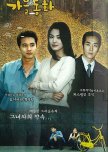
Makyang at its finest. Staged with great sensitivity. A rollercoaster ride of emotions guaranteed!
Back then, in 2000, "Autumn Tale" kicked off the celebrated "Endless Love Series" and is (like the other 3) a hit. Timeless. Heartbreaking in the face of life's unfairness. Bittersweet and tragic. "Autumn Tale" offers makjang at its finest. All of this is staged with great sensitivity. A rollercoaster ride of emotions guaranteed!Two siblings who aren't actually siblings - but nobody knows. A momentous decision when it comes out randomly. Outrageously mean intrigues. And an unshakable bond of love that (nevertheless) must not be. Because even if you might dare to rebel against the family, there is always another stroke of fate.
It is always possible for things to turn out worse - this is a promise, KDrama Land can surely give!"Autumn Tale" is prove of that. And as always with makjang: an enormous capacity for sympathy, suffering and compassion is a prerequisite for 'enjoying' this KDrama. Makjang could be considered a reinvention and revival of the idea of catharsis in connection with the Greek tragedy. On the roller coaster of human feelings between greed, love, betrayal, hate and forgiveness and suffering, scolding, laughing, crying, the moment of empathizing with the emotional processes of the protagonists can have a liberating effect. (All 4 KDramas of the "Endless Love Series" - "Winter Sonata", "Summer Scent" and "Spring Waltz", too - are actually great at ´that´. You better be prepared and ready for it... if you are, you won´t be disappointed!
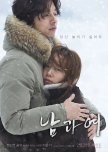
It is about the area of tension between longing, choices in life, accountability and responsibility.
"A Man and a Woman" is emotionally profound, yet subtly leading into intimate depths where it hurts, too. There are no pink ribbons. And the intimate encounter of two souls does not miraculously sort out the problems of the world in a groundbreaking way. Life is difficult. There are also unexpected beautiful moments. But life remains difficult. Is that why it's bad? Only bad? "A Man and a Woman" paints a portrait of two people who have careers of their choice and families - but life is still no lollipop. It is about having an affair. It is about wanting another life. It is about the area of tension between longing, choices in life, accountability and responsibility.Highly valuable.
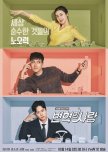
Not your usual RomCom, yet a love triangle on top of a socially critical labour dispute mission
The protagonist's name "Byeon Hyeok" means "revolution". The wordy title "Revolutionary Love" already hints that this is about a Romance. But this title also contains the second plot line: the love that leads him to revolution - to resistance and struggle for the rights of irregular workers in the company of a powerful Jaebeol. One way or another, Byeon Hyeok is at the center of events - as the eldest son of Jaebeol of the Gangsu Group, who is in love and choses the barricades (and new ways) within the corporate culture of his father's business group.Basically, the topic of such a labor dispute is rather socially critical and highly explosive, because there is practically no legal representation for the irregular part-time workers in South Korea. The number of non-regular employees is four times higher than among the other OECD member states. Employment relationship is not well protected. There is no union representation. Irregular employees usually only receive about half the wages of a permanent employee. The time limit is barely a year. Since the Asian crisis, this form of employment has proven to be cost-saving and convenient for small and large companies, so that it has been retained on a large scale to this day. "Revolutionary Love" cleverly focuses on this aspect of the South Korean working world as this critical topic is sort of camouflaged with a lot of slapstick and speed on the humorous note ... and of course there is the romance...
The role of Byeon Hyeok is a showpiece for Choi Si-won, who, with his wide array of physical, wordless visual grimaces and gestures, softens the actually frustrating labour dimension by Korean standards to a level that makes it accessible to the masses on public cable TV (and 'permissible' for the powerful). At the same time, Choi Si-won has the necessary sincerity to also show his sensitive side and create space for the closeness of a romantic relationship. In contrast to the comedic character of Byeon Hyeok is his 'friend' Kwon Jae-hoon, whose leitmotif ´seriousness´ can hardly be surpassed. In between, the head of the "revolution" whirls: the street smart Baek Joon.
"Revolutionary Love" is a KDrama that is often underestimated by Western viewers in its ambitious socio-critical and labour policy claims. It knows how to touch with the protagonists' love triangle despite the labour dispute mission. Yet, be aware, it is not your usual RomCom.
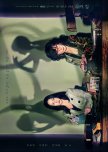
Psychological thriller re. gaslighting & family, wonderfully wrapped in the cloak of a black comedy
Psychological thriller meets black comedy. “Bittersweet Hell” is wonderfully staged in many ways. The script may have its weaknesses here and there, but the performance as a whole quickly makes you forget about that. Lee Hye-young clearly steals the show from Kim Hee-sun here. However, it's hard to top her fantastic performance as the eccentric mother-in-law (which alone might make a rewatch worthwhile...). Together they form a resolved mother-mission-duo, both determined to fight the 'WE' of their family, in which they feel deeply at home… even if this 'WE' might have plenty of flaws... Eventually, the cast is also hand-picked in other ways, e.g. with KPop Idols Yeonwoo, Jaechan and Chansung. Overall, I´d say “Bittersweet Hell” offers unique KDrama enjoyment.The plot is centered around the psychological phenomenon of so-called 'invalidating communication', which is also known as 'gaslighting' – after the play "Gas Light", which became particularly famous in the 1944 film adaptation "The House of Lady Alquist" with Ingrid Bergman. Gaslighting is about deliberately and consistently misleading a partner, family member or close friend. Gaslighting only works among close ones, i.e. trustworthy people. Thus manipulated with psychological tricks and lies, the victims feel increasingly insecure when it comes to their own perception, ultimately preferring to entirely rely on the supposedly valid judgment of their trusted person… who is now able, to fully control his/her victim. In "Bittersweet Hell" various examples of this phenomenon add to the plot dynamics. In passing, the KDrama also explores other socially explosive topics – above all the high value and ideal of ´family´ versus the sobering reality of ´actual family lives´, but also the weal and woe of the mother's role, different parenting styles and sexual orientation.
In my opinion, "Bittersweet Hell" could have used the 16 episodes (there are only 12) in order to better develop some character profiles. The effective production and performance, however, is actually very well making up for some lack of substance here and there. Therefore I´d consider this criticism a suffering on a rather high level… because nevertheless, “Bittersweet Hell” comes along as a great psychological thriller about gaslighting and family, wonderfully wrapped in the cloak of a black comedy.
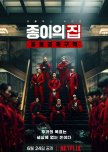
Korea´s socio-political North-South dynamics suspensefully catapulted into mass consciousness
"Money Heist: Korea - Joint Economic Area" is a remake of the Spanish Netflix production "La casa de papel". As with "Designated Survivor: 60 Days", "Suits" or "The Good Wife", this South Korean remake also sticks closely to the original. Many viewers may work through what is better, whether it is necessary, etc. - Not me, though. Rather, what fascinates me is how specifically Korean socio-political dynamics have been woven into the present story and suspensefully catapulted into a global consciousness.Against this background, the series is truly brilliant. Most viewers might probably miss this or could care less, and thus don't even pay attention to it. Nevertheless, this or that might eventually fall in places, unconsciously. Be as it may be...
"Money Heist: Korea - Joint Economic Area" takes place in a fictional economically united Korea. This premise as a setting alone is ingeniously visionary, because it conveys into the mass consciousness such a not sooo unrealistic agreement scenario for the stuck situation between the two countries: An economic union that could be profitable and attractive for all sides... Yet, immediately the potential stumbling blocks are swimming in the wake... Exploitation, fraud, abuse! The promise of freedom and unlimited opportunity turns out to be just more profit and opportunities for those who are already living in the fast lane. The promising scenario for peace and prosperity for everybody might be one side of the coin, a raised index finger is pointing to the other side already: Attention! Wiheom! Danger!
"Money Heist: Korea - Joint Economic Area" is provoking with a dramaturgical "Hello-Wake-Up!" - On the one hand these potential capitalist dynamics could make a promising peace scenario possible, but on the other hand, in the same breath, would also torpedo it. This is where the big plan of the 'professor' comes in. He wants to counteract the machinations of the powerful, who are busy filling their already full pockets, regardless of those, who pay the price. Thus he comes up with a spectacle that will shake up the public (and their decision-makers). In the end this might ultimately force the system to be more mindful and aware in approaching a true joint venture in order to make it work for the people (not only the CEOs and the powerful).
In this context, the characteristic difficulties between Koreans from North and South are successfully demonstrated again and again: the deep distrust that has been actively cultivated for so long. The fear that the war, which has officially not ended yet, will openly continue. The constant spying. The contempt for the other system. All of this was politically tirelessly staged for more than half a century. Families were being torn apart almost at random back then (1950s) - like in Germany after the Second World War. At a time X, some were on one side of the boundary line and others were on the other. Coincidence. Fate. What followed after that was propaganda, both here and there. Building up an enemy image. And what was done back then, even if the framework conditions for rapprochement might been created, has to heal over time first. (This can be learned by the experience in Germany: having reunited for more than three decades, still in society the 'wall' between ´Ossis´ and ´Wessis´ has not yet been truly overcome...)
"Money Heist: Korea - Joint Economic Area" succeeds in weaving a realistic future scenario for a united Korea into an exciting story. With all difficulties and opportunities. In this respect I consider this KDrama a strong production. In doing so, the KDrama brings this possibility of a Korean peace closer into the mass consciousness - first of all for the South Korean society, which is extremely sensitive to this topic, but ultimately also for the rest of the world.
I also have criticism.
This is neither concerning the story nor the actors, on the contrary. And it is not about the fact that connoisseurs of "La casa de papel" will be strongly reminded of the original (including the names of the characters). No. I rather have a more general complaint regarding many Korean Netflix productions (vs. the national KDrama TV productions).
-First, there is the spice up of the narrative style for an international (rather male) eye that is generally used to a good portion of sex & crime and a higher pacing. Well, I don´t need it.
-Second: Why not really telling the story to the end? Yes, it could be "worth" one or more seasons, but nevertheless. They even split the first season into part 1 and 2. I don´t like it.
-Third: The sensitive emotional momentum, that is so crucial for KDramas, is reduced to the max. Yet, the strength of a KDrama, in my experience, is that we are emotionally drawn inside, that we identify ourselves, feel empathetic, and get very close to the protagonists, get involved into their world. International Style on the other hand is rather characterized by keeping a critical distance. Here the audience is watching from the outside. The story and acting may grab you, but you stay outside and watch. You don't necessarily get emotionally involved. What is happening will be and will remain the story of others. In this particular case as well. So unfortunately once again a central KDrama unique selling point was abandoned for the standards of international Netflix world. This is not necessarily bad, yet different. I would say the experience of watching is less intense compared to other KDramas.
Luckily, the KDrama in general has more than one crucial strength and can instead show off some of those others. So does "Money Heist: Korea - Joint Economic Area"...
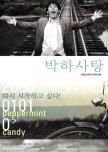
Not nice to watch but definitely worth seeing. Superbly done in many ways. Powerful. Resonating.
Prolog:The conclusion for the protagonist in his late 30s is rather tragic: he´s getting the urge to go back. He wants the life of his late youth back. He cannot continue with who he is today. For him, there is only one option remaining – a shortcut to the exit.
However, for the audience, the end is actually the beginning. The journey goes backwards in seven chapters. And when we finally reach the start, it actually makes sense to look at the ending again... (in movie-terms: its beginning...)
-------------------------------------------------- ----
“Peppermint Candy” was one of the top ten movies in 2000. The international awards it collected are respectable. And even in 2022, “The Guardian” has it listed in 12th place among South Korean film classics. Meaning: It was topical back then and still hasn’t lost its impact. It´s cult. It can be considered particularly valuable. However, it´s not particularly nice, though. Rather particularly powerful and ferociously intense.
"Peppermint Candy" dates from 1999. It tells the story of the previous two decades of South Korean history using the example of an arbitrary, inconspicuous individual. For audience who isn´t firm in recent South Korean history, the KMovie may be reduced to the protagonist as an individual - to his very personal story and his tragic ending. For all those who know something about the historical, social background (see the side note below if you like), the KMovie becomes a memorial on screen that commemorates all those in society who were probably thus affected in one way or another, too, and may have had a similar experience. And there were quite a few.
In 1999, South Korea looked back on two extremely eventful decades. Two decades that were endured, sustained, borne by the people... Two decades that, in addition to democracy, turbo-capitalism and material prosperity, also produced a whole series of psychological cripples.
I actually don't like the word 'cripple', but somehow it seems appropriate in this case, here in the sense of: people who were maltreated by others or 'by life´s circumstances' to the point of psychic unconsciousness (even if perhaps they themselves were involved as perpetrators, too). People who were broken by their fate and trauma, not being allowed to and/or able to talk about it. People who fell, lost themselves, could no longer get back on their feet, feeling helpless. Completely bent. People who could not find peace with their shame and guilt. In their inability to communicate about it and get help, they became a total human failure for those around them.
In reverse "Peppermint Candy" portrays the career of such a psychological (and physical) 'cripple' in intense scenes. We may acknowledge the individual fate. Even without historical background and regardless of socialization, we acknowledge a broken soul, of which all that is left to the outside world is actually an 'asshole'. Once a poetic, delicate, sensitive spirit... it´s hard to believe. Actor Sol Kyung-gu expands the entire range of his skills, convincingly and uncompromisingly drawing the audience into each of his divers crucial, rather unpleasant emotional life situations.
“Peppermint Candy” is superbly done in many ways. Not too much, not too little. Ruthless. And in pointed, symbolic imagery, the scenes gain in emotional power and meaningfulness as they progress - even after we have travelled a few sequences further (back) - to the extent that the puzzle of drastic life events accumulated are coherently put together into a pile of shards.
The protagonist in "Peppermint Candy" is experiencing the significant historic events of his generation at the forefront. His psychical downward spiral cannot be stopped. But this protagonist is no exception. Countless people in their late thirties in South Korea in 1999 could have told such or similar stories. During those traumatizing two decades the public was carelessly left alone to individually deal with what had happened. What a person experienced emotionally, what a person had to process and couldn't, the decisions made, the guilt, the shame, the pain – the answer to that was mainly psychological repression and silence about it. The consequences in everyday life: Outbursts of acting up and/or apathy. Sometimes the old wound hurts again. The old wound makes man fall to the ground, by its pain that he cannot escape. But it is also a phantom pain - the desperate suffering over an essential piece of 'who I am' that was taken away once and for all...
The protagonist in "Peppermint Candy" suffers on behalf of an entire generation of anonymous young people who were quietly worn down, deeply psychologically shattered and finally by the two decades of the 80s and 90s, the time of transition from military dictatorship to modern capitalism existentially bankrupt. The KMovie reaches out to all those who may have had a similar experience and/or were able to sympathize. Where communication had been lacking for decades, the KMovie, with its sometimes disturbing insights, tries to build a bridge: with understanding that may even extend to empathy. "Peppermint Candy" manages to connect the South Korean people through the fate of this one fictional man and his personal environment. (Additionally, it may even touch the rest of the world). Yongho, who could be 'anyone', and with him the women in his life, his friends (?), his colleagues and his victims who had crossed his path, who could also be 'anyone'…
Not nice to watch. But definitely worth seeing.
Powerful. Resonating. A convincingly empathetic work.
A work of passion.
--------------------------------------------------------------------------------
SIDE NOTE: --- Brief overview of the historical background of South Korea - regarding May 1980 in Gwangju, the 1980s under repressive police violence, and the years of economic miracle up to the Asian crisis of 1997-1999. ---
May 1980 in Gwangju, South Korea, featured a bloody massacre that the police and military were ordered to carry out on their own people. Yet, that massacre of Gwangju remained an official taboo for almost two decades. What happened in Gwangju back then was kept secret from the rest of the country. Then, the city was deliberately cordoned off. The enemy was officially called 'communism' (especially in student circles, supposedly under the infiltrated influence of North Korea.)
Those who survived May 1980 in Gwangju and perhaps could or would have wanted to talk about it were pressured, persecuted, tortured and put in camps. The others who preferred to remain silent had to figure out by themselves how to emotionally digest what had happend.
President Chun Do-hwan, who succeeded his predecessor Park Chung-hee in the aftermath of the bloody spring of 1980, did not create any less autocratic structures for the common people than before with his dictatorship. On the contrary. With him, brutal torture was carried out in the spirit of a systematic cleansing. The years of Chun Do-hwan's rule were some of the worst for South Korea in terms of political repression. His mission: The country should use all its might to present itself to the rest of the world as dazzling and up-and-coming until the Olympic Games. Whatever/whoever was bothersome was put away. However, the autocratic rule of the dictator and his brutal power apparatus with police and secret service ended in 1987 as a result of unbridled, enormous public pressure. The people's longing for democracy was finally able to prevail.
Parallel to the repression under Chun Do-hwan, the 1980s and following years were characterized by the years of economic miracle. The market became increasingly liberalized and it was all about exports. Yet, on a large scale growth and prosperity were built on credit: direct investments from abroad, credit cards for the people in the country, loan sharks for all those smaller companies that couldn't get the money from the banks. But the bubble of the expansive credit economy of the 1990s burst in 1997 with the Asian crisis. The credit boom was followed by a crash, an enormous fall in the value of the won, a series of bankruptcies, unemployment all over the place and poverty for the many.
Even though South Korea got back on its feet astonishingly quickly in the course of the subsequent years of the so called IMF Economic Crisis, the path was marked by countless fates of bankruptcies and many families suffering from for a long time since.
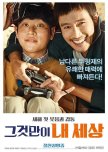
Disillusioned life scenario, yet spiked with moments as the ego steps aside + heartopening happens
A wonderful movie in many ways.This KMovie is aiming straight at the heart. This is already indicated in the international title "Keys to the Heart". Also, that the piano plays a key role - i. e. its 88 white and black keys.
The original title is more like "This only is my world" and refers in its own way to the piano, because this is the world of the autistic protagonist Jin-tae. However, this also refers to the (also limited) world of his brother Jo-ha, to which Jin-tae starts belonging. Additionally, revolving around Jin-tae (and Jo-ha) is their mother. "Keys to the Heart" is a story about that mother and her two very different sons. She left one of them decades ago as a little boy under dramatic circumstances and to date he hasn't forgotten, let alone forgiven. The other is autistic with savant syndrome.
It´s a given that the story intends to bring tears to your eyes. Yes. The story wants to get to the heart. But not generally in a tender, comforting and blissful manner. In fact, there is nothing but pain drifting around those hearts in this story. The framework of the plot draws a disillusioned, depressed scenario of the lives of ALL characters - regardless of whether they are rich or penniless, or otherwise have a more or less comfortable living. (The exception to the rule here is the autistic Jin-tae.) As if it were the most natural thing in South Korean everyday life for people to suffer. There is a good deal of social criticism in this KMovie. I think that's often overlooked in its critics or reviews.
There's the drinking, beating father; the abandoned son; the penniless son who can do nothing but box; the brutal world of dog fighting, where boxers beat each other bloody for money; the single mother with cancer; the mother with guilt; the autistic son; the depressed, suicidal, rich, once famous invalid; the Jaebeol CEO, whose money doesn't help her to be able to buy back her daughter's happiness. Eventually "Key to the Heart" is a dreary, sobering contemporary document. Not a picture of society of the crisis-ridden 1990s, no. It is a simple, unpretentious social inventory of the South Korean affluent society from the year 2018...
Now, some heart-warming light is shining into this fundamentally gloomy everyday world. (And in those of the audience as well.) In rather small spots though. These are brief details, inconspicuous moments (apart from the big spotlight of the finale, which is a bit more spectacular). However, those little spots make all the difference. Not a flash of inspiration, rather a flash of the heart, in which the injured ego steps aside for a moment: for a moment of clarity for the essential: actually, what´s NOW. For a moment, people can just let go of all grief and become open to what life has to offer just NOW: beauty, warmth, joy, hope. This NOW can transform, heal, completely change the view of the world. The world on this earth itself is the same, yes, the planet does not change its orbit because of it. It's not suddenly 'everything will be fine again'. And yet it is something like 'everything-IS-good'. ... That brings us to the KMovie's favorite quote: "Impossible is not a fact. It's an opinion." (Muhammad Ali)
Admittedly, a button is pressed when it comes to the piano music. The classics take their space. But here, too, the story does not fail to take the opportunity to point out the ego-driven business with it - the talent and passion of the musicians may be on the one hand, but the very personal interests of teachers and directors are on the other...
Of course, with Jin-tae as a young man with an autism spectrum disorder with savant syndrome, the KMovie is deliberately pressing another selected button, with the intention of moving hearts. Nevertheless, even this developmental disorder is not romanticized, yet shown as demanding and exhausting to deal with.
Particularly pithy and powerful: The contrast between the world of the buttoned-up, reserved, respectable, reasonable and properly dressed classical music scene and the childlike, impulsive and playful but brilliant Jin-tae, whose piano playing tears down walls for a moment.
At last, we are back at the beginning: a story about that mother and her two very different sons... There is hurt, sorrow, the pain of loss and guilt - all is there, what life has to offer to become estranged from each another, or to feel lonely and abandoned. And that's where love - no matter how screwed up - finds its screwed-up moments. I don't think predictability is a problem with this movie, because it doesn't want to be 'enthralling'. Yet, it wants to touch the heart, and it does. Eventually, that's good for everyone. With this movie, it is the HOW that is decisive: by sober narration of a basically rather depressing story that thrives on short, unspectacular moments (and the actors) in which 'new' NOW-decisions are made and heart opening becomes possible.
Great!
--------------------------- SIDE NOTES --- Savant syndrome ---
Savant syndrome has often been a topic in the cinema, for example in the US production "Rain Man". There are only around 100 "Savants" known worldwide (from the French 'savoir' = knowing, how to do it). Accordingly, the phenomenon has only been scientifically examined to a limited extent. In the musical field, there are various examples of Savants (like the fictitious Jin-tae here in the movie) who, without any music lessons, are able to play the most difficult pieces of music with accentuated detail after just hearing it once - solely thanks to their perfect hearing.
However, Savant syndrome usually goes hand in hand with autism spectrum disorders. This in turn refers to developmental disorders of varying severity. The people affected typically have little interest and competence when it comes to social interaction. They prefer to live in their own world. Generally, their perception is strongly focused on details and does not weight them like the otherwise socialized majority around them. Details that others usually overlook become subjectively crucial, while information considered essential to their environment may not play any particular role at all. Information is initially unfiltered, being of equal value in its perception. Thus, without the social-cognitive filters that non-autistic people learn to develop, the moment of sensory overload followed by stress is quickly reached.
--------------------------------------------------------------------------------------
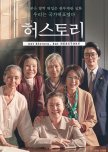
It is not a fun movie, yet it is radiating truly positive energy in spite of its appalling topic
"Herstory" is an example of a highbrow KMovie, which has real life as its subject and at the same time influences real life as an impact of the movie reception.It is about the lawsuit brought by a handful of "Comfort Women" from Busan - actual long forgotten/ignored sex slaves for the Japanese soldiers during the Second World War. The trial took place between 1992 and 1998 in Japan. This noteworthy trial set in motion the resolution of a rather dark chapter in recent Asian history.
It was about time to not look away anymore. The subject of "Comfort Women" was until then a taboo subject even in South Korea. The refered to court hearing in the 1990s was actually a milestone in the reappraisal of this chapter. Thus the KMovie "Herstory" is a poignant, publicly effective monument to this chapter in history and honoring the affected, victimized and long forgotten women (and their advocats).
"Herstory" is sensitively illustrating the painful path to this (no less painful) trial as well as its dramatic individual cases. The KMovie becomes the mouthpiecer of at least a few of those women´s fates and at the same time a touching memorial, arousing the awareness of the cruel war crimes committed against civilian women.
It is not a fun movie, yet it is radiating a tuely positive energy in spite of its appalling topic! I consider it in several respects highly valuable.
It is about empowerment and sisterhood. The cast ist outstanding.
This movie is confronting glorious ´his´stories with ´his´ rather tabooed ignominious behaviours... and thus make it ´her´stories.
---------------- SIDE NOTE --- Historical Comfort Women in World War II ---
For a long time, the fate of an estimated 200.000 Korean young women and girls, who were traumatized as sex slaves by the Japanese military during World War II, went unnoticed by the world. Until the 1990s their existence was a taboo - even in South Korea! In fact, Japan's government and military recruited (mostly) Korean young women and girls. They were used against their will in so-called "comfort stations" as "Comfort Women" for motivation of the armed forces - i.e. as sex slaves being abused by the sodliers.
Officially, this fact was (and still is to some extent) vehemently denied by the Japanese side and hasn´t been clarified for more than 5 decades, let alone talked about reparations. However, in terms of international law, what happened has to be considered war crimes, crimes against humanity, as well as slavery and trafficking in women and children - crimes they are. However, the war crimes tribunals after the end of the Second World War were more concerned with crimes against members of the Allies. So in public THOSE crimes against civilian women were forgotten.
With this particular court hearing the movie is refering to, for the first time a verdict in favor of the (comparably few) plaintiffs was at least partially reached. The ladies, who had meanwhile aged, were actually awarded a ridiculously small amount of compensation. So the verdict is still outrageous, but a verdict nonetheless. Nevertheless, as a result, the story of comfort women was publicized for the first time and an international reparation movement was launched.
Obviously the topic had appeared on the table ... but it was still not legally clarified. On the contrary. The issue as such (and its many and even more individuale cases) have still not been satisfactorily resolved ... while most of the actual victims have by now died of age.
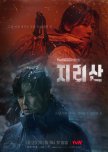
"Jirisan" radiates within the slowed down, yet powerful dynamic of the mountain world
"Jirisan" pays tribute to South Korea's first and largest national park and its rangers, who ensure security and order here. The KDrama weaves an exciting story that also takes into account the special aura of the mountains, adding a good portion of mysticism. Actually Jiri Mountain is quite legendary and downright sacred for Korea. It's worth watching the KDrama for that alone.Other quality guarantees are given by the handpicked cast and high-end production.
A joy for some, a curse for others: "Jirisan" radiates within the slowed down, yet powerful dynamic of the mountain world. The story itself is a bit reminiscent of a mountain hiking tour: it's not a stroll. You need the right footwear. Sometimes you might think you've lost your way. The story is told in several timelines. Yet it chooses its own rhythm with a sure step, that leads to the final destination. On the way it is continuously enriched with worthwhile vistas along the entire route... Fast pace and airy love story are not part of the baggage. But exciting entanglement over time, unconditional trust as a topic in the team of rangers, as well as love in its essential form and various expressions (... e.g. for the mountain).

Not world-shaking at all, though it can be quite witty at times
It's about a vampire who wants to become human. However, fans of vampire stories alert! "Heartbeat" is at best Vampire-'light'. First and foremost, this is ´Rom´ with double ´Com´. It is casual entertainment, its topping made of tried and tested patterns, and clichés, too.Essentially, "Heartbeat" thrives on the special relationship dynamics between the two protagonists, with a rather intractable young woman crashing into an old vampire, who has been robbed of his supernatural powers/resources and who, due to a mishap, is now neither really vampire nor human. The humor and charm of the story lies in this somewhat awkward constellation. Determined female protagonist meets bewildered, somehow lost within identities male protagonist. The whole story is embedded in a stylish, handsome ambience as well as this and that (four-dimensionally knitted) subplot. Romantic vibes are guaranteed and on top of that a bit of suspense, too.
"Heartbeat" isn't world-shaking at all, though it can be quite witty at times. It's fun when you're in the mood for it. With a down-to-earth female protagonist whose everyday life (for a pleasing change) is not predominantly structured by wardrobe and make-up.
Here and there, however, production obviously chose the striking to the logical: No money but the large property always in festive lighting? The protagonist's gothic chambers always bathed in the candlelight of countless candles, regardless of whether he is there or not? (And who would be in charge of this? He never has to light it up, nor blow it out when he leaves... they are always burning.) Well. Ok, let´s not nit-pick…
"Heartbeat" obviously doesn't take itself too seriously when it comes to such details. If you can overlook this and that, then it´s fun@work... as fun and light entertainment are clearly the goal. So, don´t expect more than that.
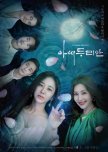
RomCom, crime, historical drama, fantasy & Makjang make the dough for something standalone new
"Durian's Affair" is set among the wealthy - ´here´ (2023) and likewise ´there´ (long gone Joseon days). The time may have changed for Du Ri-an and her daughter-in-law, but the place has not. They are instantly catapulted from their Joseon days to recent today. Some of the wealthy family, who own the property today, have apparently reincarnated again in this family. They are especially well known to Du Ri-an. Now those involuntary time travelling ladies have to deal with the culture shock and the traumatic leap in time that actually seems as incredible as a dream, whereas in their own days they were actually in the midst of grieving over the loss of their beloved son/husband...This bizarre, four-dimensional dramaturgical setting is providing a load of finely knitted entanglements and arising questions, yet unanswered. What had really happened back then? What's going on today in this family? Why the time jump? So what's next for the two Joseon-day ladies? How is everyone going to deal with this weird practical (and for some even emotional confusing) situation?
This production is full of zeitgeist of the 2020s, in which Anglicisms and Banmal (informal speech) are a matter of course, while in mass consciousness the curtain between different times and spaces has become extremely permeable. Yet, the icing on the cake: relationship dynamics in the fourth dimension. The people of that long gone time are not those of today. And yet... There are notions of their life back then, even if they cannot consciously remember it, as well as the option of making new decisions in their life today. Broken hearts, cupid's arrow, greed and passion, as well as a sense of responsibility or noblesse oblige... it's all mixed up through the perspective of the time-travelling ladies of days gone by. Situation comedy breaks through encrusted structures. The strangely insane is tossing and turning the minds of reincarnates and time travellers alike. Likewise, the strangely familiar is, too.
"Durian's Affair" is one of those KDramas that wants to break with established genres. The South Korean, but also the international market is currently being flooded with excessive KDrama productions. Thus there is increasingly space opening up for experiments... and that's what “Durian´s Affair” is, too. This KDrama is no RomCom, no crime thriller, no historical drama, no fantasy and also no classical Makjang. However, elements of each are richly included. Together they create something independently new. Anyone who is open to such an experiment should sit back, relax, shake off the usual expectations and get involved with the KDrama. It's entertaining. With some open questions that keep the suspension throughout all 16 episodes. There are also love interests. (Yes, plural.) All multi-layeredly entangled across time and space. Additionally, “Durian´s Affair” is even exuding a pleasant scent of humanness.
Be prepared for deliberate Sostenuto! The pacing is characteristic, since the production sticks consistently with the two outdated ladies from Joseon days. And in my opinion, those ladies are the ones who make the show as remarkable as it is. Regarding Du Ri-an and her daughter-in-law, all characters in the show as well as the audience alike can work themselves off. Nice!
----------------------------------------------------------------------------
SIDENOTE: --- A reckoning with the lost virtues of a conservative South Korean society ---
“Wheresoever you go, go with all your heart.” -Confucius
In my opinion, "Durian's Affair" is kind of a reckoning with pseudo-virtues of a conservative South Korean society. Du Ri-an and her daughter-in-law are catapulted into Seoul 2023 and show the elite clan around the Dan family what true Confucian virtue actually means. At the same time, they are caricatures as those virtues come along as an almost unattainable ideal. The two ladies from back then embody i.e. propriety, righteousness, integrity, benevolence, wisdom and trustworthiness in such an uncompromisingly consistent way that one cannot help but be amazed. Confucian virtues are inextricably linked to patriarchy. But the lesson in this idealistic self-image of a dignified, respectful life is given to us by two women! Adaptably creative, intuitive, respectful and well grounded. Timelessly human, righteous, wise and trustworthy.
Du Ri-an and her daughter-in-law embody the Confucian virtues, but more than that, they have transcended them without realizing it and found an answer for what these (and every other virtue, too,) are actually intended for: A source of self-confidence as a human being and dignity, from which a person can draw strength and grounding - even in the most adverse situations! In general, this as a prerequisite for any human, compassionate, authentic encounters. Those virtues had to be (necessarily, involuntarily) adapted by those ladies into a completely foreign century. (And they prove themselves again and again in every one of the three different households of the Dan family.) So it is actually about the core essence of any virtue: providing a human being with dignity and inner values as a compass – reaching out with the power of respect and thus transcending boundaries of specified classes, too.
The two time travelers come across as idealized caricatures of the bygone Joseon period, that is generally considered virtuous. As foreign ladies in Seoul 2023, they embody rather unreal, almost exaggerated ideals of virtues that are still upheld and (as it turns out) actually largely lost. And yet, the two ladies prove it: true, authentic dignity can grow from the upright embodiment of these virtues. This dignity matches its dramaturgical equivalent in the overall deliberate Sostenuto pacing of the K-drama.
The timelessness of the old values stands in apparent contrast to the growing western internationalized coolness and the elitist arrogant version of the new nobility, which however seems to have lost any grounding unless it is for money. It is rather obvious: a bit more humanness, morality, integrity, wisdom and trustworthiness would be nice here and there. What is offered above all is a shiny facade cushioned by the bank account. More or less covered underneath you find any human topic irrespective of class or wealth: longing to be loved, self-doubt, jealousy, gender issues, fear of aging, love in old age, temptation...
In "Durian's Affair" the head of the family clan may be a (actually surprisingly liberal) woman. Homosexual love can become a topic here, too. And then there are a few more time-sensitive issues in play. Yet, authenticity and sincerity are primarily triggered by the two noble, upstanding Joseon ladies... They may remind one or the other just by their attitude towards life, that human dignity is deeply rooted inside - even though one may have lost or forgotten about it along the way.
Don’t get me wrong. I'm not standing here for Confucian virtues. And neither does the KDrama. But it holds a nicely presented mirror to South Korean society, which to this day may hide behind the 'old, time-honoured' values. For better or for worse. If so, then it might be crucial to fill these virtues with life. Message: The present is far from that. Fascination? Yes. Attraction? Perhaps. But embodied? No. Two ladies from the past must be landing in 2023. (And actually they had to carry their baggage at home back then - a baggage whose weight was characterized by a questionable virtue (also) of the people of that distant time.)
“Durian´s Affair” rejects any kind of idealization. How nice, indeed! Yet it upholds authenticity (as a new and needed virtue?), basic for any respectful human-to-human encounter. As a value! As the true virtue! And with that - against this background - "Durian's Affair" becomes quite a progressive KDrama production. What a delightful surprise!
PS:
And then, the ending. It is open for all you can imagine. Any direction. You choose, where to go next. Drama just like the human condition (la condition humaine.) Like the wheel of existence, fueled by Karma! It goes on and on... A never ending story of birth and rebirth...
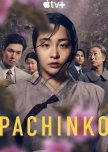
Not a KDrama, but a dramatic Korean story with a lot of Korean heart. (A hybrid?)
Ok, this series tells a Korean story, it´s about Korean destinies. BUT it's not an original KDrama. It is a (western) Apple production in which some (Apple) producers from the US obviously had a say. So, first of all, a bit of criticism about the American serial adaptation of a bestseller novel, which 'coincidentally' has a Korean fate as its subject. (Before I go into praise...)North Americans with Korean family backgrounds may have been involved in the production (the directors, the person responsible for the script adaptation and a lot of actors, for example). Nevertheless, it is and remains a North American production. The sad thing about it: the series production repeats - if you like - the theme of the story in a new media version: in this case, the profitable exploitation of 'Korean stories', 'Korean fates' and even a bit of the KDrama soul...
Using the example of several generations of a Korean family and their personal destinies against the background of Japanese colonization and racism to this day, why reduce a 500-page book to ONLY 8 episodes? Why not use the time and space and retell the story in at least 20 episodes, or even 50?
Quite simply: the series production is not of South Korean origin, and it is not made for South Korean television, but for the international streaming market. The rest of the world isn't THAT interested in South Korea, but it is quite touched by Korean fates. So, the enthusiasm for the original bestseller in a binge-capable, compact format has to be cleverly marketed in a colorful and moving way in order to attract new streaming subscribers to Apple. The world (those who have not yet read the book but have now watched the series) is shocked and touched by what happened between Japan and South Korea, which is still today formative for many Koreans. The rest of the world was hardly aware of this historical chapter. However, in the series adaptation, the individual fates were told less in detail. They were rather reduced to catchy basic emotions, and these were cleverly knotted as a cross-generational leitmotif in key scenes over time jumps. The focus is on Sunja - with the focus on Sunja in her third phase of life. This is embodied by Youn Yuh-jung, who was already able to leave a lasting impression on the international audience with (her Oscar for) "Minari" and thus gets plenty of screen time as a 'star' among many internationally comparatively unknown actors.
Well, that's the way it is.
If you have a background with KDrama, you will find a nice study object in "Pachinko" to compare the different narrative styles (Western style vs. Korean style) with regard to emotionality. Western style would be more like: 'I WATCH the mimes have their feelings'. The individual sequences of different timelines, some of which are strung together at very short intervals, convey this 'Western' handwriting. This is, so to speak, Western objectivity in the depiction of emotionality. The (South) Korean narrative style, on the other hand, deliberately draws the audience into the emotional world. E.g. 'I sympathize. I'm IN there too.'
So, with "Pachinko" there was a lot of Korean heart and soul mixed into the story and series adaptation. You can feel that. This is how an interesting hybrid production actually came about. It's not a KDrama, but a Korean story with a lot of Korean heart. Thus, the spirit of Korean storytelling still blows through some of the scenes. Actually, even the concept chosen for the series adaptation is the strongest element: if such a complex family saga is told in 8 episodes, then through the characteristic basic emotions in the form of impressive scenes - less in plot, action and dialogues. For example: when the mother ceremonially prepares the rice for the wedding, which they are actually not allowed to eat, or the young bank employee throws his expensive jacket into the puddle and dances footloose to the street music on the open street (in Japan!), or the grandmother, completely moved, after decades back on South Korean soil on the beach of her childhood... There are strong scenes like this - lastingly impressive, without words - that (want to and actually do) touch the heart. THAT, I would think, is Korean style in the way of its storytelling. It somehow sneaked into the production (still US production, even if it was trilingual) and confidently took its place. (Perhaps in the same way that people under Japanese oppression quietly preserved their inner dignity and inner defiance despite all bending and suffering.)
And by the way: the title track may be well and good. But! The intro clip is in my eyes most peculiar and completely missing the subject. It's nice that all generations come together here, but the extreme exuberance of the dance performance has nothing to do with the rest of the series. It seems rather strange, how in contrast to the particular, muted, rather gloomy 'Han' (Korean pain/world pain) of the story it comes along in such outlandish US style...
Nevertheless: the series is captivating, moving and over all a rather inhospitable excursion into inhospitable Korean living conditions, which are emotionally shaped for some even to this day by the Japanese colonial era. Even decades later in Japan and the USA, life is shown rather inhospitable. Only a few well-chosen scenes open up in a visually stunning and atmospheric way, as if to remind us that life itself is a gift...
Even if it's only told in 8 episodes (and by now apparently in 8 more for a second season), "Pachinko" offers an unforgettable, visually stunning excursion into a sad segment of recent Korean history using the example of a moving family saga. A concentrated load of multifaceted contemporary rich topics that can at best be roughly touched or tabbed upon in the series adaptation. Nevertheless. It is definitely a masterpiece to compress the 500-page epic into 8 slim episodes and - without having to bend the story too much - to convey a stringent, central emotional attitude even in the face of the inhospitable nature of being: the protagonist despite all the suppression keeping a quiet, inner dignity, grounded and clear - from there drawing the strength to face life and its challenges again and again, in all simplicity.
Lastingly impressive!
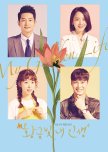
Weekend family drama, progressively challenging the concept of becoming/living as an ´adult´
“My Golden Life” is one of those KDramas that have been writing drama-history in South Korea. It is considered a 'national' series – popularity increased rapidly, the number of viewers doubled during the broadcast and towards the end, almost half of all nationwide TV audience during the weekends, while “My Golden Life” was broadcast, watched this series."My Golden Life" is a family drama, that doesn't just get lost in family clichés, Makjang and RomCom, but instead explicitly addresses some critical contemporary issues. Additionally, given attitudes and convictions are boldly deconstructed along the way. Thus, "My Golden Life" is a rather progressive family drama, involving also the 'quite new' concept of making personal life decisions despite (and in opposition to) family interests. In addition, more than one protagonist is questioning his/her life decisions or is forced to dealing with 'failure' (up to 'depression' as a result of learned helplessness), which is also quite progressive. Whether rich or poor, such issues likewise hit any income classes - in “My Golden Life”, too. In addition, there are current long-running topics such as the (lack of) work-life balance, discrimination because of social status, and the shame of divorce, as well as the increasingly sensitive issue of 'age'.
Ultimately “My Golden Life” is progressively challenging the concept of maturing in the sense of making my own, accountable decisions and thus becoming/living as an ´adult´. What does it mean, what does it need to be an 'adult'? ´Adult´ in the sense of having grown out of the familiar nest and being able to fly with my own wings? In the sense of being challenged to apply what I have learned in my own, individual manner? Is it allowed? Actually desired? Even wanted?
Notably gratifying and astonishing: Throughout the series, practically all of the divers family members go through their personal maturing processes against the background of various contemporary social issues. Many dramaturgical motifs may be familiar, but you can be sure that sooner or later everyone will be challenged with their attitudes and decisions being on trial. “My Golden Life” is not about stumbling through life with a social reptilian brain in obvious stimulus-response pattern. And it is not about by all means controlling the environment with the arrogant mindset of absolutist power fantasies. "My Golden Life" is intelligently and systematically deconstructing the usual set screws for critical life decisions (and dramaturgical plot developments.) In the end, almost every protagonist gets challenged and in the long run actually they all come to their individual, sometimes astonishingly mature, honest and even wise reassessments and re-decisions. This is (at least in this KDrama) possible, permitted, actually prerequisite.
Strikingly symbolic to deconstruction processes of social and individual assumptions throughout the story, ´gold´ is a metaphor for the estimation and valuation of an individual life. Its meaning and value is changing throughout the KDrama, parallel to the transformation processes of the protagonists... Most of the characters initially have the conviction that money (and associated with it: status) is the prerequisite or guarantee for happiness and a worthwhile, precious life... (as on the other hand the lack or loss of money is the reason or the cause of unhappiness and equivalent to a nugatory life.) However, most of them realize over the course of story that a ´golden´ life is not necessarily one that is successful, prosperous and meaningful because of a lot of money. In fact, an elitist, privileged life - being born with a ´golden spoon´ in the mouth - eventually comes with a ´golden cage´, too... Rather, a ´golden´ life is cordial, substantial and radiant with accountability and authenticity.
Within turbulent relationship dynamics (including a bit of Makjang-style topping when it comes to plot development) the 'impoverished middle class' and the 'dirty rich Jaebeol clan' are cleverly juxtaposed against each other, thus almost offensively confronting with the exaggeration of social class-affiliation and questioning traditional mindsets; additionally, full of wit contrasting submissive obedience and self-confident rebellion. Meanwhile, a dubious, arrogantly patronizing 'Noblesse oblige' virtue is craftily criticized, too.
“My Golden Life” is sometimes funny, sometimes intelligent, sometimes outrageously provocative, sometimes infuriating, sometimes emotionally serious, sometimes touching and sometimes downright grotesque. Being set as a family weekend drama, it is supposed to be easy to digest… yet, at the same time, the KDrama is consistently keeping its unabashed finger (gently, yet persistently) on the social scrapes, quirks and deep wounds, too. An astonishingly felicitous, ambitious balancing act. Overall, “My Golden Life” isn´t long-winded, even with 52 episodes. You may as well give it a try.
P.S.:
'Reassessment' seems to be the greater moral of the story.
Meaning: Traditional structures, rules, proven patterns and given orders may be all well and good. They may give orientation and set a direction in life. They provide a certain range of tools and know-how on how you can meet the challenges of life. But ultimately, in each individual case, it is still indispensable to carefully consider the appropriate application and decide for yourself what actually should be and could be accomplished. What is it, that I want? What is it, that I can do? What is it that I think is right? And what is it, that I am willing to supply?
At the end of education and apprenticeship usually there is a form of diploma or master's degree – not for mere copying, but for suitable, at best innovative application and enhancements. And in "My Golden Life" there are quite a few characters truly having earned their award... each in their own way. Eventually, it won´t do to simply adopt what others suggest, would have done or did before. It is all about individual solutions. Traditional lifestyles and attitudes are put to the test and are systematically deconstructed - voluntarily or involuntarily. In the end, the individually appropriate reassessment and authentically fitting solution does not necessarily have to lead to an easy or obvious decision...
"My Golden Life" is thus also giving a lesson in emancipation, too - in the original Latin and also in the more modern sense. Initially, Latin “emancipatio” was the “release of the son from paternal power”. In a broader sense: the child has grown or the student has been educated, so they can hold themselves accountable for their own life tasks and work obligations and thus take responsibility and reflect on their achievements accordingly. Additionally, in a modern, more general sense, emancipation is freedom from discrimination based on group, sex or class membership…
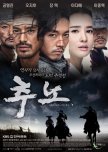
Tragic, epic, visually impressive.
"The Slave Hunters" is a cinematic-style KDrama, almost like a movie for the big screen. (It would definitely be an experience on the big screen.) In any case, "The Slave Hunters" has a lot to offer during ist 24 episodes.
There is strikingly selected staging of the landscape. Korea presents itself self-confident with its countless riverscapes and deltas, its mountains and coastal regions. The viewers visually accompany the protagonists on their long journeys across the country.
The accumulation of well-trained, well-structured torsos of the male actors is also characteristic for "The Slave Hunters". There's a lot of work involved, and it's appropriately staged here in numerous shots. Why not?
In connection with its sporty mimes, "The Slave Hunters" also comes up with a variety of brilliant, sometimes spectacularly choreographed fight scenes. Above all, Jang Hyuk once again sets quite a monument with his versatile martial arts skills.
The KDrama also presents - if you like - some Joseon-style parkour. 'Chase' thus gets a nicely invigorating touch. (Side note, in case you don´t know: Parkour is a special form of athletic movement art - a mostly urban steeplechase that has become fashionable in the last few decades. Individuals choose the most effective way to get to their destination, and that's hardly ever the predetermined path. Rather, the urban or natural landscape is re-perceived with regard to potential obstacles and evaluated as to how these can be creatively overcome on the individually chosen route, for example by jumping, somersaults or the like.)
The KDrama also stresses the subject of fatal love triangle in its complex emotionality. Eventually, there are also more love stories in the side plots. Yet, to be honest, the romance aspect should not be your reason to watch... The complicated dynamics might drive you crazy at times, so does the rigid play of the ex-and-again-general.
After all, the story mixes a good pinch of humor with profound wisdom. Surrounded by all the muscle-packed, fast-paced spectacle, the question of how a just society can be achieved is examined, i. e. whether it can ever be achieved at all. As soon as people gain power, won't they always tend to turn their fellow human beings into slaves, chattel or lackeys? And: will a changed political system change the people? Or do people have to change for the system to change? As a premise it is stressed that slaves are also human beings, e. g. that it actually starts with an attitude, that one should not deny any human being to being a human being - certainly not according to their genetic origin. "Slave Hunters" historically refers to the beginning of socio-critical Yangban movements against practiced slavery.
At the same time, the KDrama shows life under simple/poor living conditions - unembellished in all coarseness, e. g. ugly, blustering, brutal, unkempt and uneducated, but still warm-hearted. On the other hand, the fine silk clothings and the well-groomed, educated demeanor of the nobles and officials cannot hide their emotional coldness and corrupted souls.
All in all: It is not surprising that the KDrama in average thrilled more than 30 percent of the South Korean population and received numerous respectable awards and even international nomination. Above all, Jang Hyuk, for whom his role seems to be tailor-made. He fights, jumps, sprints, barks, laughs, cries, digs into the deepest depths of his soul and on top of that presents profound street smart and wise philosophies.
"The Slave Hunters" has a charm of its own. It´s tragic, epic, visually impressive.
---------------- Side Note: --- historical background ----
The historic frame refers to the time of King Injo in the 17th century as well as his son and Crown Prince Sohyeon. As a result of the submission after the second Manchu invasion in 1636, the Crown Prince (together with his wife and other officials) went to Shenyang practically as a hostage of the Qing. He spent his time there working diplomatically on peaceful relations between the Joseon and Qing dynasties.
His commitment also brought him to Beijing, where he became familiar with Western culture through his acquaintance with Jesuit missionaries. However, his father did not like Sohyeon's diplomatic commitment and open-mindedness at all. He feared that after his return and accession to the throne, he would want to reform Joseon with Catholicism and Western values. Prince Sohyeon's sudden death is interpreted by historians as deliberate poisoning. There is some evidence that his own father was behind this. Sohyeon's wife was executed for treason and only the youngest of his three sons survived their exile on Jejudo.
---------------------------------------------------------------------


 9
9 39
39 15
15















